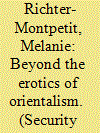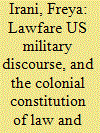|
|
|
Sort Order |
|
|
|
Items / Page
|
|
|
|
|
|
|
| Srl | Item |
| 1 |
ID:
127803


|
|
|
|
|
| Publication |
2014.
|
| Summary/Abstract |
Contrary to commonsense understandings of torture as a form of information-gathering, confessions elicited through the use of torture produce notoriously unreliable data, and most interrogation experts oppose it as a result. With a focus on the US carceral regime in the War on Terror, this article explores the social relations and structures of feelings that make torture and other seemingly ineffective and absurd carceral practices possible and desirable as technologies of security. While much of international relations scholarship has focused on the ways in which affective and material economies of Orientalism are central to representations of the 'terrorist' threat, this article connects the carceral violences in the racialized lawfare against Muslimified people and spaces to the capture and enslavement of Africans and the concomitant production of the figure of the Black body as the site of enslaveability and openness to gratuitous violence. The article further explores how these carceral security practices are not simply rooted in racial-sexual logics of Blackness, but themselves constitute key sites and technologies of gendered and sexualized race-making in this era of 'post-racial triumph' (HoSang and LaBennett, 2012: 5).
|
|
|
|
|
|
|
|
|
|
|
|
|
|
|
|
| 2 |
ID:
100427


|
|
|
|
|
| Publication |
2010.
|
| Summary/Abstract |
History has relegated much of the Great War's Liberal literature to the realm of romanticism, but Montague and others were in fact deeply political. Montague's criticisms of the Paris peace treaties and of British politicians, together with his demand for greater respect for those who had fought, helped shape the way the war was both perceived and remembered in Britain.
|
|
|
|
|
|
|
|
|
|
|
|
|
|
|
|
| 3 |
ID:
157746


|
|
|
|
|
| Summary/Abstract |
In this article, I aim to reorient debates, in International Relations and Law, about the relationship between law and war. In the last decade, writers have challenged common understandings of law as a limit on, or moderator of, warfare. They have instead claimed that law is often used as a ‘weapon of warfare’, describing such uses as ‘lawfare’. Below, rather than arguing that law is either a constraint on or an enabler of warfare, I examine how law comes to be represented as such. Specifically, I examine representations, primarily by US military and other governmental lawyers, of ‘non-Western’ invocations of the laws of war, which seek to constrain the policies or practices of the US or Israeli governments. I show how these authors cast such invocations as not law at all, but as tools of war. I suggest that this move rests on, and reproduces, colonial discourses of ‘non-Western’ legal inadequacy or excess, which serve to render ‘non-Western’ law ‘violent’ or ‘war-like’. I show that the referents and boundaries of law and war are stabilised by notions of civilisational difference, which serve to give meaning to what law is, what war is, and whether particular claims or practices are understood as martial or legal.
|
|
|
|
|
|
|
|
|
|
|
|
|
|
|
|
| 4 |
ID:
164643


|
|
|
|
|
| Summary/Abstract |
This article argues that while Foucauldian security studies (FSS) scholarship on the biopolitics of security and liberal war has not ignored racism, these works largely replicate Foucault's whitewashing of the raciality and coloniality of modern power and violence. Drawing on Black, indigenous, postcolonial and decolonial studies, we show how Foucault's genealogy of biopower rests on an unspecified concept of the “human,” failing to account for how notions of “human” were constituted through the savage and slave other, how enslaved people were rendered into things, and how punitive, sovereign violence persists as a (settler) colonial technique of gratuitous, not merely instrumental, violence. FSS exacerbates these problems. This article challenges two core FSS propositions on liberal war: 1. that “human life cannot ever be secured,” which replicates Foucault's Eurocentric reliance on an unspecified “human” as the object of biopolitics; 2. that “everyone is (potentially) dangerous” and thus open to the punitive/lethal dimensions of liberal power, which reduces racism to a sorting process after the establishment of biopolitics and liberal war, rather than a precondition of it. This “methodological Whiteness” (Bhambra 2017a) results in major oversights in FSS empirical genealogies of: state violence, twenty-first-century digital and molecular revolutions, labor, capital, and enslavement.
|
|
|
|
|
|
|
|
|
|
|
|
|
|
|
|
|
|
|
|
|